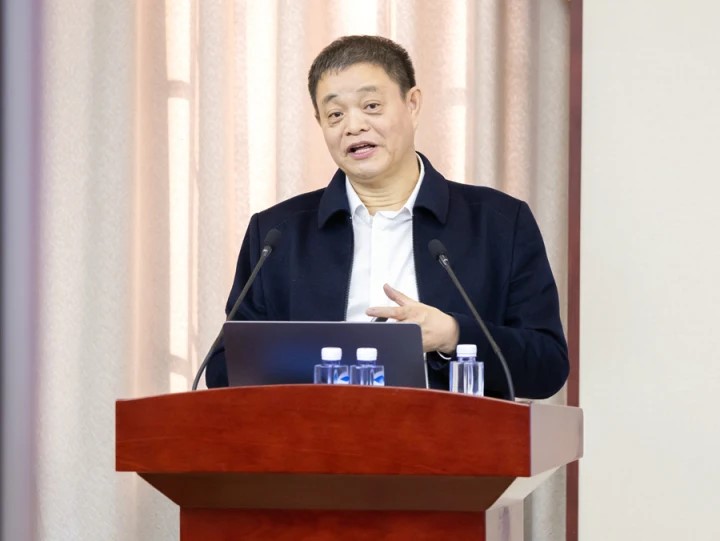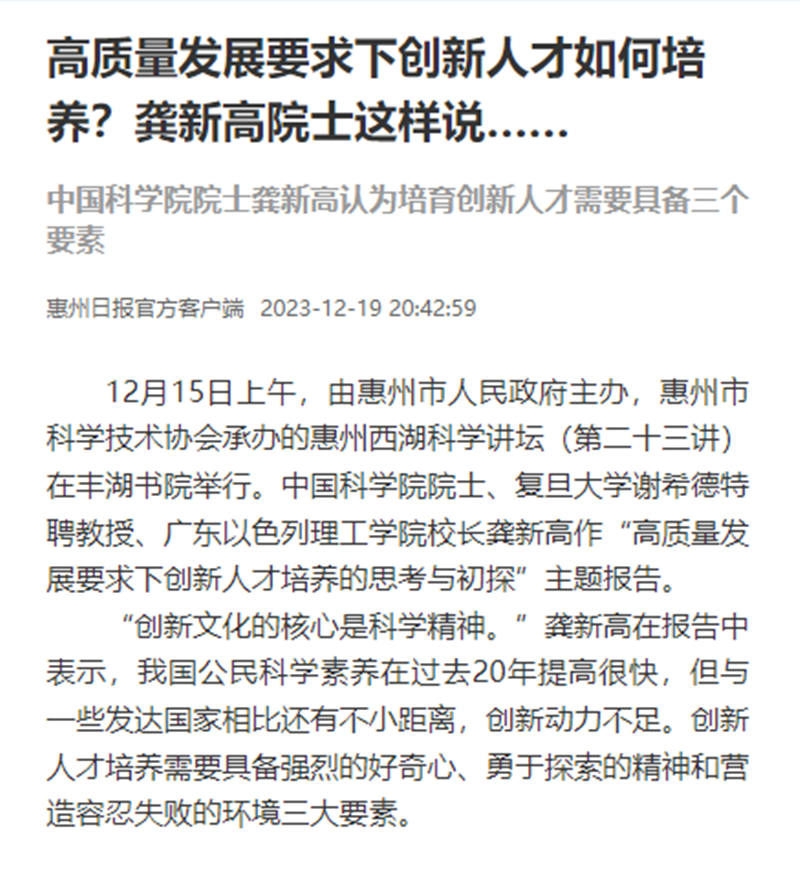PostTime:12/22/2023
On December 15, a forum named Huizhou West Lake Science Lecture Hall (The 23rd Lecture) was held in Fenghu Academy. Prof. Gong Xingao, Academician of the Chinese Academy of Sciences, Chancellor of Guangdong Technion - Israel Institute of Technology (GTIIT), and Xie Xide Distinguished Professor of Fudan University, made a report on the theme of "Thinking and Exploration of Innovative Talents' Cultivation under High-quality Development Requirements".

"The core of innovation culture is scientific spirit." Prof. Gong Xingao said the scientific literacy of citizens in our country had improved rapidly in the past 20 years, but there was still a long way to go compared with certain developed countries, and the impetus for innovation was insufficient. Cultivating innovative talents requires three elements, namely strong curiosity, exploring spirit, and an environment where failure is embraced.

new release on Huizhou Daily
Science and technology are highly different and should be properly differentiated
High-quality development is the primary task for building a modern socialist country in all respects. Accelerating the realization of high-level scientific and technological self-reliance and self-improvement is the only way to promote high-quality development and is ultimately dependent on high-level innovative talents.
By 2030, a talent system suitable for high-quality development will be basically formed, and the ability to independently train innovative talents will be significantly improved. China will be significantly more attractive to global talent, boast some frontrunners in main sci-tech fields and pioneers in emerging frontier and interdisciplinary areas. By 2035, the country will have competitive advantages in talent competition in many areas, and its strategic sci-tech strength and high-caliber talent teams will be among the strongest in the world.
How to cultivate innovative talents and foster a culture of innovation? In his report, Prof. Gong Xingao pointed out that universities contributed to economic growth and national competitiveness by providing students with more advanced thinking and academic skills. He mentioned that little was known about how the skills of undergraduates from Science, Technology, Engineering and Mathematics (STEM) backgrounds differed across countries, although universities had invested heavily in STEM education.
Over the past 20 years, the scientific literacy of Chinese citizens has been effectively improved, but problems such as the incorrect distinction between science and technology, the insufficient proportion of basic research in scientific research, and the weakened basic knowledge of mathematics, physics, chemistry as well as science and engineering remain.
The core of innovation culture is scientific spirit, with three major elements
Prof. Gong Xingao took Israel, a country of innovation, as an example to analyze Israel's innovative genes. According to reports, technology contributes more than 90% to Israel's GDP, ranking first in the world; the number of its NASDAQ-listed companies exceeds the sum of all European companies. Meanwhile, Jews account for 0.2% of the worldwide population while 22.5% of Nobel Prize winners.
"All of these seemingly incredible facts are closely related to Israel's innovation genes." Prof. Gong Xingao indicated that Technion - Israel Institute of Technology (Technion), established with innovative genes as the core of growth, had sent a large number of key talents to Israel's fields of aeronautical science and technology, microelectronics, medicine, computers, and modern agriculture, etc., and that 70% of people engaged in high technology in Israel came from the university.
Can the successful model of talent cultivation from Technion be replicated? As Prof. Gong Xingao mentioned, the achievements of GTIIT demonstrated that students' academic abilities had been greatly improved under GTIIT's talent cultivation model.
"The core of innovation culture is scientific spirit." According to Prof. Gong Xingao, under the conditions of international vision and academic frontiers, fostering a culture of innovation requires three elements, namely strong curiosity, exploring spirit, and an environment where failure is embraced.
After the report, on-site educators raised their confusion and concerns to Prof. Gong Xingao. He believed it's significant for educators to keep children's curiosity and exploring spirit, and create as much space as possible for their trials and errors.
Text/Photos: Huizhou Daily, GTIIT News & Public Affairs
© GUANGDONG TECHNION-ISRAEL INSTITUTE OF TECHNOLOGY | 粤ICP备17036470号
